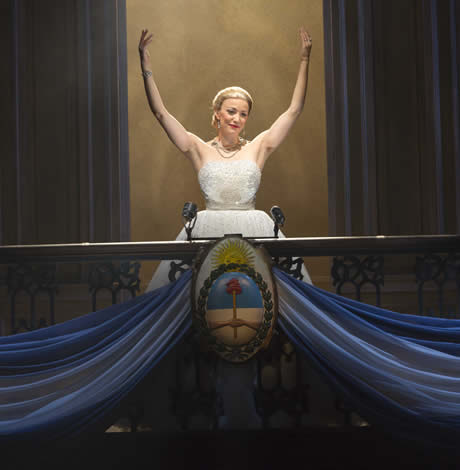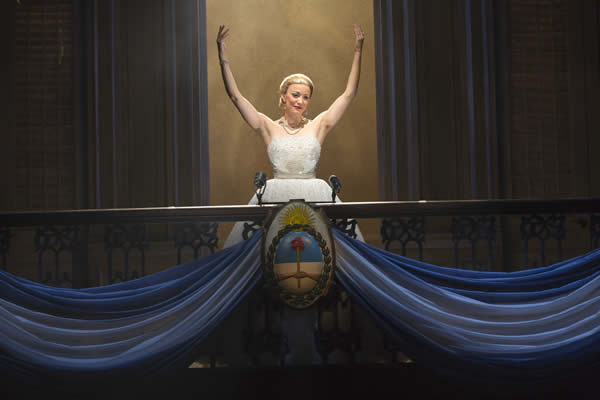Theater
Great dames
From ‘Evita’ to ‘Marie Antoinette,’ fall full of strong female protagonists


Caroline Bowman as Eva Peron in the national tour of ‘Evita.’ It comes to the Kennedy Center this month. (Photo by Richard Termine; courtesy Kennedy Center)
Labor Day is scarcely past. But the fall theater season is already well underway. With an exciting amalgam of both new and familiar musicals and plays with LGBT themes performed and staged by out theater professionals, this autumn promises to be an especially engaging time for LGBT theatergoers. Here’s a sampling of what’s out there now and what’s soon to come.
Olney Theatre Center is premiering “Colossal” at its Mulitz-Gudelsky Theatre Lab through Sept. 28. Penned by Andrew Hinderaker and directed by Will Davis who is transgender, this hard-hitting drama told in flashback by Mike, a former college football player who became paralyzed from the waist down after taking a hit for his teammate (and then-lover) during a game. Mike (played by Michael Patrick Thornton who uses a wheelchair on and offstage) now relives the accident again and again with the aid of a live football team onstage. Structured like a game, “Colossal is performed in four quarters with a pre-show training session and half-time show.
Canadian/director Morris Panych’s new comedy “The Shoplifters” is currently premiering at Arena Stage’s Kreeger Theatre. The cast features Broadway’s Jayne Houdyshell as a career shoplifter. Panych’s husband, Ken MacDonald, designed the costumes and set.
Woolly Mammoth Theatre Company kicks off the season with David Adjmi’s “Marie Antoinette” (Sept. 15-Oct. 12). The playwright’s revisionist comedy paints the young queen as contemporary rich party girl. The cast features Woolly company members Kimberly Gilbert (as the ill-fated royal) and out actor Sarah Marshall who plays Marie’s friend, an all-knowing sheep.
The national tour of Tim Rice & Andrew Lloyd Webber’s “Evita” (Sept. 30-Oct. 19) is heading to the Kennedy Center Opera House. The Tony-winning musical thrillingly recounts Eva Perón’s climb from obscure poverty to money and international fame as Argentina’s very blonde first lady. This production features Broadway’s beautiful Caroline Bowman as the controversial legend who died at just 33.
On Oct. 5, Positive Scribe Productions presents Laurinda D. Brown’s “Sometimes It Snows in Atlanta” at the Anacostia Playhouse. In this autobiographically inspired piece, Brown, who has grappled with depression, explores mental health issues in both the African-American and LGBT communities.
At Signature Theatre in Arlington, out artistic director Eric Schaeffer is staging the musical “Elmer Gantry” (Oct. 7-Nov. 9), based on Sinclair Lewis’ novel about a failed salesman who makes a mint selling salvation. Broadway’s Charlie Pollock plays the titular, Bible-thumping con artist. The cast features local vocal powerhouse Nova Y. Payton as speakeasy singer Mary Washington and out actor Bobby Smith as Gantry’s pal Frank Shallard, a mainstream preacher who is losing faith.
Also at Signature is Lisa Eason’s “Sex with Strangers” (Oct. 14-Dec. 7), a timely exploration of what happens when private lives become public domain. Out actor Holly Twyford is slated to play Olivia, an underemployed 39-year old writer who hooks up with a younger more successful stranger after a blizzard leaves them trapped in a secluded cabin. When the pair’s experience goes online what should have been a quick tryst morphs into something more. Aaron Posner directs.
For one night (Oct. 20), Rainbow Theatre Project, a company dedicated to reflecting the LGBT experience, will feature staged readings of Mary Steelsmith’s “The Betty and Veronica Plays” and David Csontos’ “My Night with Rock Hudson.”
At Studio Theatre, out director Serge Seiden is staging Joshua Harmon’s “Bad Jews” (Nov. 5-Dec. 21), a biting comedy about three very different cousins battling over a family heirloom on the night of their Holocaust survivor grandfather’s funeral.
Theatre J is presenting gay playwright Tony Kushner’s “The Intelligent Homosexual’s Guide to Capitalism and Socialism with a Key to the Scripture” (Nov. 13-Dec. 21) staged by out director John Vreeke. The plot centers on retired longshoreman Gus Marcantonio as he gathers his three adult children (of which two are in same-sex relationships) and their partners to let them know he’s selling the Brooklyn brownstone and ending his life. Lots of meaningful talk ensues.
For a sweet pre-holiday serving of nostalgia try “Donny & Marie: Christmas at the National” (Dec. 2-7; nationaldc.org). In the tradition of the Osmond family holiday specials of yesteryear, the show features splashy numbers, Christmas songs and hits from the toothy cute siblings’ heyday.
The holiday theme continues with Round House Theatre’s area premiere of a new musical, “The Nutcracker” (Nov. 26-Dec. 28) staged by out director Joe Calarco. The cast includes talented out actor Will Gartshore, who said he couldn’t turn down the chance to play a French sock monkey.
Gartshore is also doing a mostly musical theater cabaret with the Gay Men’s Chorus of Washington called “Love Stinks!” It happens on the afternoon of the Nov. 8 at Hamilton Live.
Publick Playhouse (5445 Landover Road, Cheverly, Md.) has several family-friendly shows planned for fall including “Curious George” (Sept. 25), “The Wright Stuff: First in Flight” (Oct. 8), “The Mixed-Up Fairy Tale” (Oct. 30) and more. Visit arts.pgparks.com for details.
Theater
Magic is happening for Round House’s out stage manager
Carrie Edick talks long hours, intricacies of ‘Nothing Up My Sleeve’

‘Nothing Up My Sleeve’
Through March 15
Round House Theatre
4545 East-West Highway
Bethesda, Md. 20814
Tickets start at $50
Roundhousetheatre.org
Magic is happening for out stage manager Carrie Edick.
Working on Round House Theatre’s production of “Nothing Up My Sleeve,” Edick quickly learned the ways of magicians, their tricks, and all about the code of honor among those who are privy to their secrets.
The trick-filled, one-man show starring master illusionist Dendy and staged by celebrated director Aaron Posner, is part exciting magic act and part deeply personal journey. The new work promises “captivating storytelling, audience interaction, jaw-dropping tricks, and mind-bending surprises.”
Early in rehearsals, there was talk of signing a non-disclosure agreement (NDA) for production assistants. It didn’t happen, and it wasn’t necessary, explains Edick, 26. “By not having an NDA, Dendy shows a lot of trust in us, and that makes me want to keep the secrets even more.
“Magic is Dendy’s livelihood. He’s sharing a lot and trusting a lot; in return we do the best we can to support him and a large part of that includes keeping his secrets.”
As a production assistant (think assistant stage manager), Edick strives to make things move as smoothly as possible. While she acknowledges perfection is impossible and theater is about storytelling, her pursuit of exactness involves countless checklists and triple checks, again and again. Six day weeks and long hours are common. Stage managers are the first to arrive and last to leave.
This season has been a lot about learning, adds Edick. With “The Inheritance” at Round House (a 22-week long contract), she learned how to do a show in rep which meant changing from Part One to Part Two very quickly; “In Clay” at Signature Theatre introduced her to pottery; and now with “Nothing Up My Sleeve,” she’s undergoing a crash course in magic.
She compares her career to a never-ending education: “Stage managers possess a broad skillset and that makes us that much more malleable and ready to attack the next project. With some productions it hurts my heart a little bit to let it go, but usually I’m ready for something new.”
For Edick, theater is community. (Growing up in Maryland, she was a shy kid whose parents signed her up for theater classes.) Now that community is the DMV theater scene and she considers Round House her artistic home. It’s where she works in different capacities, and it’s the venue in which she and actor/playwright Olivia Luzquinos chose to be married in 2024.
Edick came out in middle school around the time of her bat mitzvah. It’s also around the same time she began stage managing. Throughout high school she was the resident stage manager for student productions, and also successfully participated in county and statewide stage management competitions which led to a scholarship at the University of Maryland, Baltimore County (UMBC) where she focused on technical theater studies.
Edick has always been clear about what she wants. At an early age she mapped out a theater trajectory. Her first professional gig was “Tuesdays with Morrie” at Theatre J in 2021. She’s worked consistently ever since.
Stage managing pays the bills but her resume also includes directing and intimacy choreography (a creative and technical process for creating physical and emotional intimacy on stage). She names Pulitzer Prize winning lesbian playwright Paula Vogel among her favorite artists, and places intimacy choreographing Vogel’s “How I learned to Drive” high on the artistic bucket list.
“To me that play is heightened art that has to do with a lot of triggering content that can be made very beautiful while being built to make you feel uncomfortable; it’s what I love about theater.”
For now, “Nothing Up My Sleeve” keeps Edick more than busy: “For one magic trick, we have to set up 100 needles.”
Ultimately, she says “For stage managers, the show should stay the same each night. What changes are audiences and the energy they bring.”
Theater
‘Octet’ explores the depths of digital addiction
Habits not easily shaken in Studio Theatre chamber musical

‘Octet’
Through Feb. 26
Studio Theatre
1501 14th Street, N.W.
Tickets start at $55
Studiotheatre.org
David Malloy’s “Octet” delves deep into the depths of digital addiction.
Featuring a person ensemble, this extraordinary a capella chamber musical explores the lives of recovering internet addicts whose lives have been devastated by digital dependency; sharing what’s happened and how things have changed.
Dressed in casual street clothes, the “Friends of Saul” trickle into a church all-purpose room, check their cell phones in a basket, put away the bingo tables, and arrange folding chairs into a circle. Some may stop by a side table offering cookies, tea, and coffee before taking a seat.
The show opens with “The Forest,” a haunting hymn harking back to the good old days of an analog existence before glowing screens, incessant pings and texts.
“The forest was beautiful/ My head was clean and clear/Alone without fear/ The forest was safe/ I danced like a beautiful fool / One time some time.”
Mimicking an actual step meeting, there’s a preamble. And then the honest sharing begins, complete with accounts of sober time and slips.
Eager to share, Jessica (Chelsea Williams) painfully recalls being cancelled after the video of her public meltdown went viral. Henry (Angelo Harrington II) is a gay gamer with a Candy Crush problem. Toby (Adrian Joyce) a nihilist who needs to stay off the internet sings “So anyway/ I’m doing good/ Mostly/ Limiting my time/ Mostly.”
The group’s unseen founder Saul is absent, per usual.
In his stead Paula, a welcoming woman played with quiet compassion by Tracy Lynn Olivera, leads. She and her husband no longer connect. They bring screens to bed. In a love-lost ballad, she explains: “We don’t sleep well/ My husband I/ Our circadian rhythms corrupted/ By the sallow blue glow of a screen/ Sucking souls and melatonin/ All of my dreams have been stolen.”
After too much time spent arguing with strangers on the internet, Marvin, a brainy young father played by David Toshiro Crane, encounters the voice of a God.
Ed (Jimmy Kieffer) deals with a porn addiction. Karly (Ana Marcu) avoids dating apps, a compulsion compared to her mother’s addiction to slot machines.
Malloy, who not only wrote the music but also the smart lyrics, book, and inventive vocal arrangements, brilliantly joins isolation with live harmony. It’s really something.
And helmed by David Muse, “Octet” is a precisely, quietly, yet powerfully staged production, featuring a topnotch cast who (when not taking their moment in the spotlight) use their voices to make sounds and act as a sort of Greek chorus. Mostly on stage throughout all of the 100-minute one act, they demonstrate impressive stamina and concentration.
An immersive production, “Octet” invites audience members to feel a part of the meeting. Studio’s Shargai Theatre is configured, for the first, in the round. And like the characters, patrons must also unplug. Everyone is required to have their phones locked in a small pouch (that only ushers are able to open and close), so be prepared for a wee bit of separation anxiety.
At the end of the meeting, the group surrenders somnambulantly. They know they are powerless against internet addiction. But group newbie Velma (Amelia Aguilar) isn’t entirely convinced. She remembers the good tech times.
In a bittersweet moment, she shares of an online friendship with “a girl in Sainte Marie / Just like me.”
Habits aren’t easily shaken.
Theater
Out dancer on Alvin Ailey’s stint at Warner Theatre
10-day production marks kickoff of national tour

Alvin Ailey American Dance Theater
Through Feb. 8
Warner Theatre
513 12th St., N.W.
Tickets start at $75
ailey.org
The legendary Alvin Ailey American Dance Theater is coming to Washington’s Warner Theatre, and one of its principal veterans couldn’t be more pleased. Out dancer Renaldo Maurice is eager to be a part of the company’s 10-day stint, the kickoff of a national tour that extends through early May.
“I love the respectful D.C. crowd and they love us,” says Maurice, a member of esteemed modern dance company for 15 years. The traveling tour is made of two programs and different casting with Ailey’s masterwork “Revelations” in both programs.
Recently, we caught up with Maurice via phone. He called from one of the quiet rooms in his New York City gym where he’s getting his body ready for the long Ailey tour.
Based in North Newark, N.J., where he recently bought a house, Maurice looks forward to being on the road: “I enjoy the rigorous performance schedule, classes, shows, gym, and travel. It’s all part of carving out a lane for myself and my future and what that looks like.”
Raised by a single mother of three in Gary, Ind., Maurice, 33, first saw Alvin Ailey as a young kid in the Auditorium Theatre in downtown Chicago, the same venue where he’s performed with the company as a professional dancer.
He credits his mother with his success: “She’s a real dance mom. I would not be the man or artist I am today if it weren’t for the grooming and discipline of my mom. Support and encouragement. It’s impacted my artistry and my adulthood.”
Maurice is also part of the New York Ballroom scene, an African-American and Latin underground LGBTQ+ subculture where ball attendees “walk” in a variety of categories (like “realness,” “fashion,” and “sex siren”) for big prizes. He’s known as the Legendary Overall Father of the Haus of Alpha Omega.
WASHINGTON BLADE: Like many gay men of his era, Ailey lived a largely closeted public life before his death from AIDS-related complications in 1989.
RENALDO MAURICE Not unusual for a Black gay man born during the Depression in Rogers, Texas, who’s striving to break out in the industry to be a creative. You want to be respected and heard. Black man, and Black man who dances, and you may be same-sex gender loving too. It was a lot, especially at that time.
BLADE: Ailey has been described as intellectual, humble, and graceful. He possessed strength. He knew who he was and what stories he wanted to tell.
MAURICE: Definitely, he wanted to concentrate on sharing and telling stories. What kept him going was his art. Ailey wanted dancers to live their lives and express that experience on stage. That way people in the audience could connect with them. It’s incredibly powerful that you can touch people by moving your body.
That’s partly what’s so special about “Revelations,” his longest running ballet and a fan favorite that’s part of the upcoming tour. Choreographed by Alvin Ailey in 1960, it’s a modern dance work that honors African-American cultural heritage through themes of grief, joy, and faith.
BLADE: Is “Revelation” a meaningful piece for you?
MAURICE: It’s my favorite piece. I saw it as a kid and now perform it as a professional dance artist. I’ve grown into the role since I was 20 years old.
BLADE: How can a dancer in a prestigious company also be a ballroom house father?
MAURICE: I’ve made it work. I learned how to navigate and separate. I’m a principal dancer with Ailey. And I take that seriously. But I’m also a house father and I take that seriously as well.
I’m about positivity, unity, and hard work. In ballroom you compete and if you’re not good, you can get chopped. You got to work on your craft and come back harder. It’s the same with dance.
BLADE: Any message for queer audiences?
MAURICE: I know my queer brothers and sisters love to leave with something good. If you come to any Ailey performance you’ll be touched, your spirit will be uplifted. There’s laughter, thoughtful and tender moments. And it’s all delivered by artists who are passionate about what they do.
BLADE: Alvin Ailey has been a huge part of your life. Thoughts on that?
MAURICE: I’m a believer in it takes a village. Hard work and discipline. I take it seriously and I love what I do. Ailey has provided me with a lot: world travel, a livelihood, and working with talented people here and internationally. Alvin Ailey has been a huge part of my life from boyhood to now. It’s been great.




















